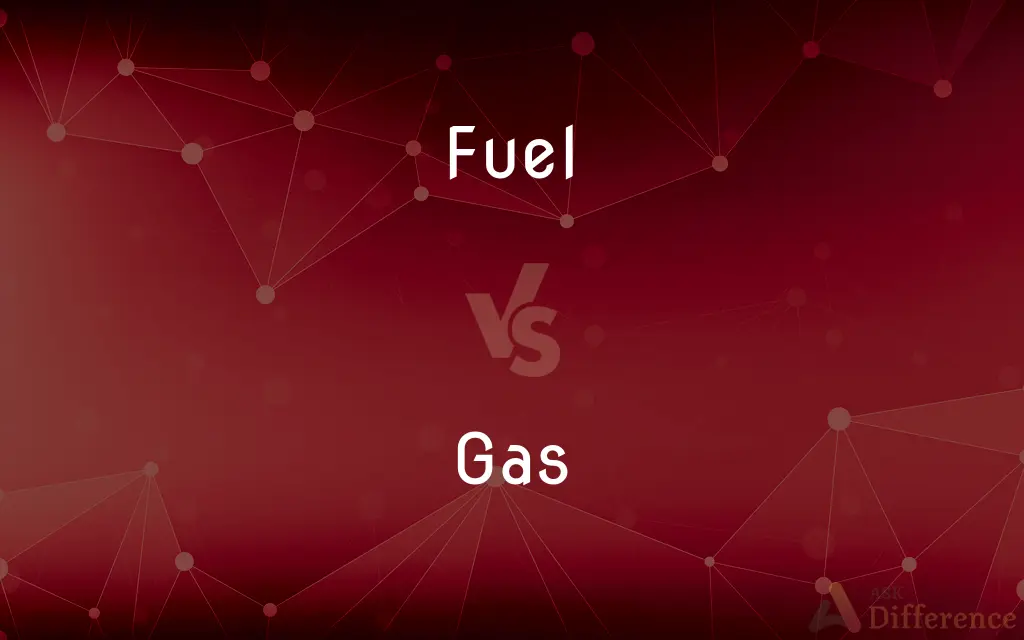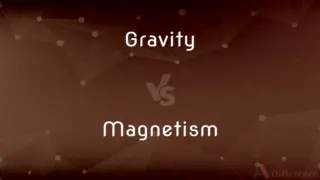Fuel vs. Gas — What's the Difference?
Edited by Tayyaba Rehman — By Fiza Rafique — Published on February 24, 2024
Fuel is a broad term for substances used to produce energy, including solids, liquids, and gases, while "gas" specifically refers to the gaseous state, often used for energy like natural gas.

Difference Between Fuel and Gas
Table of Contents
ADVERTISEMENT
Key Differences
Fuel encompasses a wide range of substances, including wood, coal, gasoline, and natural gas, used to generate power or heat through combustion or other chemical reactions. Gas, in the context of fuel, typically refers to substances like natural gas or propane that are in a gaseous state at room temperature and are used for heating, cooking, and as automotive fuel.
While all gases used for energy can be considered fuel, not all fuels are in a gaseous state. Solid fuels like coal and biomass and liquid fuels like gasoline and diesel play crucial roles in various applications, from electricity generation to transportation.
Gases like natural gas are prized for their efficiency and cleaner combustion compared to solid and liquid fuels, resulting in lower emissions of pollutants and greenhouse gases. However, the infrastructure for transporting and storing gases can be more complex and costly.
The choice between gas and other forms of fuel often depends on factors such as availability, cost, intended use, and environmental considerations. For instance, natural gas is preferred for residential heating in areas where it is easily accessible, while gasoline remains dominant in the automotive sector.
Comparison Chart
State
Can be solid, liquid, or gas
Always in a gaseous state
ADVERTISEMENT
Types
Wood, coal, gasoline, diesel, natural gas
Natural gas, propane, butane
Uses
Power generation, heating, transportation
Heating, cooking, some transportation
Environmental Impact
Varies widely; solids and liquids often more polluting
Generally cleaner, but methane leaks can be an issue
Infrastructure
Depends on type; can range from simple to complex
Requires pipelines, storage tanks, and safety measures
Compare with Definitions
Fuel
A material used to produce heat or power through chemical or nuclear reaction.
Coal has been a traditional fuel for heating and electricity.
Gas
A state of matter characterized by neither fixed shape nor volume, easily compressed.
Helium gas is used to fill balloons.
Fuel
Nuclear fuels like uranium produce energy through nuclear fission.
Nuclear reactors use enriched uranium fuel to generate electricity.
Gas
Propane, a liquefied petroleum gas, is used in heating appliances and vehicles.
Propane tanks are commonly found in backyard grills.
Fuel
Liquid fuels derived from petroleum used in internal combustion engines.
Gasoline is a common fuel for cars.
Gas
Natural gas, primarily methane, is used for heating and electricity.
Many homes use natural gas for heating and cooking.
Fuel
Solid fuels include materials like wood and coal used in fires and stoves.
Wood pellets are a popular fuel for eco-friendly heating systems.
Gas
Butane, similar to propane but with different properties, used as fuel.
Butane is often used in portable heaters and lighters.
Fuel
Biofuels are derived from living matter, offering a renewable energy source.
Ethanol, made from corn, is blended with gasoline as a fuel for vehicles.
Gas
Hydrogen gas, a potential clean fuel for vehicles and industry.
Hydrogen fuel cells power some eco-friendly cars.
Fuel
Any matter used to produce heat by burning; that which feeds fire; combustible matter used for fires, as wood, coal, peat, etc.
Gas
A substance in the gaseous state.
Fuel
Substance consumed to provide energy through combustion, or through chemical or nuclear reaction.
Gas
The state of matter distinguished from the solid and liquid states by relatively low density and viscosity, relatively great expansion and contraction with changes in pressure and temperature, the ability to diffuse readily, and the spontaneous tendency to become distributed uniformly throughout any container.
Fuel
A material such as wood, coal, gas, or oil burned to produce heat or power.
Common Curiosities
Can fuel be renewable?
Yes, certain types of fuel like biofuels and hydrogen (when produced from renewable sources) are considered renewable.
Is electricity considered a fuel?
Electricity is a form of energy, not a fuel, but it can be generated from various fuels, including gas and coal.
Is gas more expensive than other fuels?
The cost of gas compared to other fuels varies by region, availability, and market conditions.
Why is natural gas considered a cleaner fuel?
Natural gas burns more completely and produces fewer pollutants compared to coal and oil.
How is gas stored and transported?
Gas is often stored in tanks as a liquid (LPG) or compressed (CNG) and transported via pipelines or containers.
How does the efficiency of gas compare to other fuels?
Gas is generally more efficient and produces more energy per unit than many solid and liquid fuels.
Are there safety concerns with using gas as fuel?
Yes, gas is flammable and can be explosive, requiring careful handling and storage.
Can all gases be used as fuel?
Not all gases are suitable as fuel; only those that can combust or react chemically to release energy, like natural gas and hydrogen.
Are all liquid fuels derived from petroleum?
While many are, there are also biofuels like ethanol and biodiesel derived from biological sources.
What are the main uses of gas in homes?
Heating, cooking, and hot water are the primary uses of gas in residential settings.
Can gas fuel be used in all types of vehicles?
Special engines are required to use gas as fuel, such as those designed for CNG or LPG.
What is the environmental impact of using gas as fuel?
While cleaner than coal and oil, methane leaks from gas usage can contribute to greenhouse gas emissions.
Is coal still a widely used fuel?
Yes, coal remains a significant source of energy, especially for electricity generation in many countries.
Can the use of gas as fuel help reduce carbon emissions?
Switching to gas from more polluting fuels can reduce carbon emissions, but long-term solutions involve renewable energy sources.
What are the challenges of transitioning to gas from other fuels?
Infrastructure costs, availability, and adapting existing technologies are significant challenges in transitioning to gas.
Share Your Discovery

Previous Comparison
Gravity vs. Magnetism
Next Comparison
Homoerectus vs. HomosapienAuthor Spotlight
Written by
Fiza RafiqueFiza Rafique is a skilled content writer at AskDifference.com, where she meticulously refines and enhances written pieces. Drawing from her vast editorial expertise, Fiza ensures clarity, accuracy, and precision in every article. Passionate about language, she continually seeks to elevate the quality of content for readers worldwide.
Edited by
Tayyaba RehmanTayyaba Rehman is a distinguished writer, currently serving as a primary contributor to askdifference.com. As a researcher in semantics and etymology, Tayyaba's passion for the complexity of languages and their distinctions has found a perfect home on the platform. Tayyaba delves into the intricacies of language, distinguishing between commonly confused words and phrases, thereby providing clarity for readers worldwide.













































